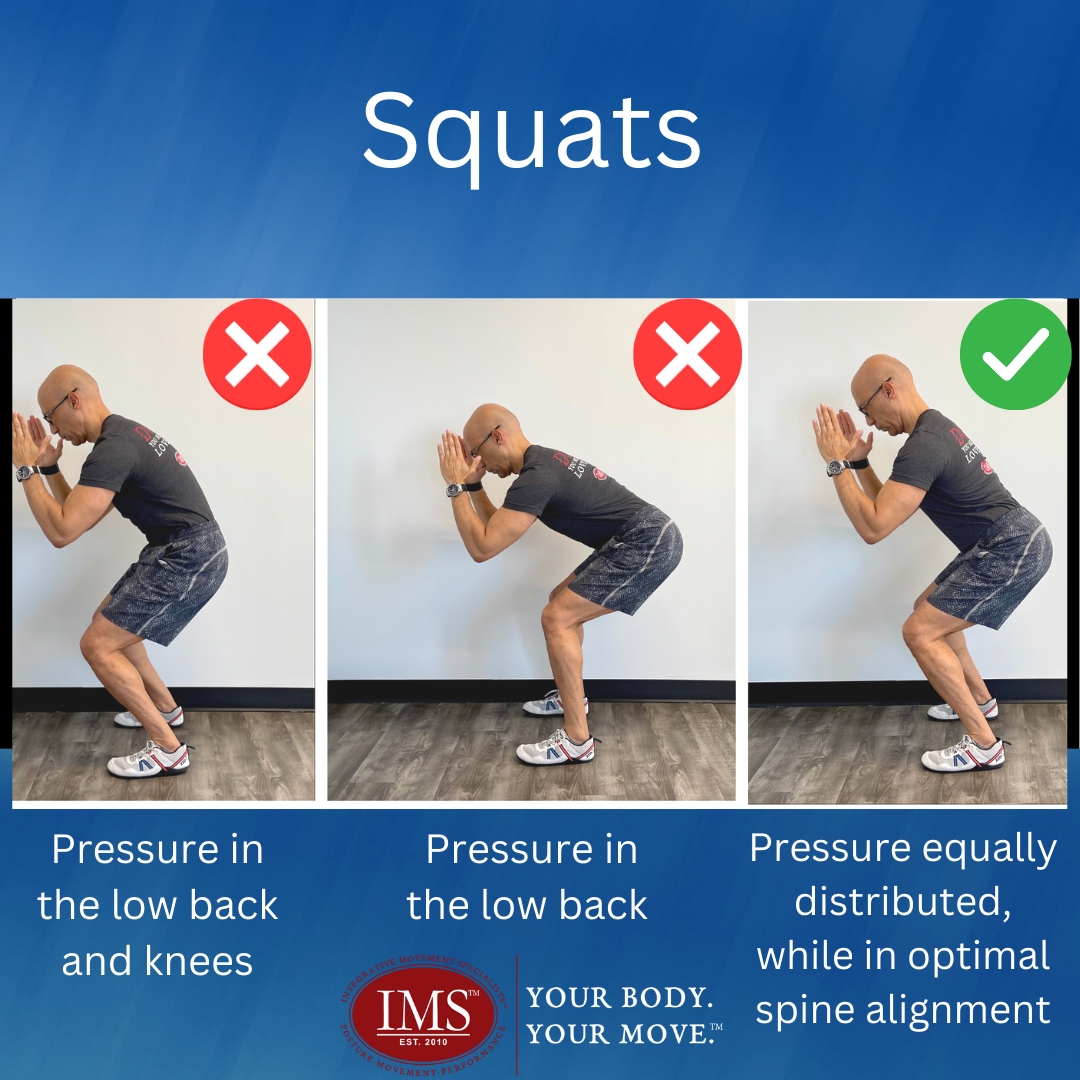Blog
Squat Patterns and Progressions for Balance, Walking, Fitness & Life
For more helpful resources, visit our blog.
How Well Do You Squat? Take the Quiz
How would you rate your ability to squat?
Take this quiz.



Did you answer yes to any of the above in our second quiz?
Is how you squat the root cause of your discomfort? Likely not.
However, the habits you use while squatting, (any of the ones you said yes to in our first quiz) are likely habits you use throughout your everyday activities, for posture, and for exercise.
Check out the video on this page where we talk about how to squat optimally for the health of the spine, hips, knees, and more.
We also covered safe and effective progressions of the squat to help improve leg, back and. glute strength while also improving balance and walking.
Check out the This. Not That. photos below for ideas for optimal versus nonoptimal ways to squat.
Squatting is an activity that you do all day long. How you do it is very important.




How You Squat is Important for Your Back and more...

|
||||
|
Posture and Exercises Guideline to Start 2024
Happy New Year!
We hope 2024 is off to a great start!
This year in our newsletters and videos we will be covering and digging into the most optimal way to use posture and exercise for the health of your muscles and joints and overall body.
In our most recent webinar, we covered sitting and standing posture along with:
- Hip hinge for your low back
- Squat for your hips
- Lunges and your knees
- Bent over row and the forward shoulder
- Triceps and stress in the wrists
- Chest press pressure on the spine
- Biceps and using inertia
- Planks and the spine
- Push-ups and the upper back posture
- Carries and stress on the shoulders and neck.
Each month this year we will dive deeper into each of the exercises listed above using the principles of the Integrative Movement System, alignment, breathing and control.
We will cover:
- optimal mechanics
- common cues that are less than optimal
- progressions
- modifications
- application to everyday life
We hope you can join us on our monthly webinar...
Move Well Webinar: 3 Exercises That Can Help Or Hurt Your Back
|
|||
|
Move Well Webinar: Hip Hinges & Squats
Enjoy the recording from our Move Well Webinar where we covered and coached you through the proper form of squats and hip hinges.
Does the action of squatting especially when exercising bother your knees or back?

Does the action of squatting especially when exercising bother your knees or back?
It is a common concern for many. Some are even being told by their doctor to avoid squats. While that sounds easy enough, it is nearly impossible to avoid squatting in your everyday life. Squatting is required to sit. This means, when you use the restroom, sit to eat, watch T.V. sit. your desk, drive, etc.
It seems that is a necessary activity so let's take a look at what might be going wrong during the squat that may be causing the discomfort.

If you caught our last installment we spoke about the importance of moving through the hip joint to alleviate pressure on the low back as seen in the top photo. The model bends or rolls through the hip joint as she goes down into the squat. This motion helps the model use the large muscle of the glute to stand back up versus the muscles of the back or around the knees.
In the bottom photo, the model is not bending through the hips but rather is bending...
Put some IMS Magic in Your Squats

Squats. You may love or hate them when it comes to exercise but, the movement is a basic movement of life. In and out of a chair is a squat. On and off a toilet is a squat.
Even a basic movement of a squat can cause many to have back or knee discomfort. Often we hear clients are advised by well-meaning health professionals to avoid squats. As you can see that is almost impossible if you understand the fundamentals of movement.
Let's take a look at some less-than-optimal ways to squat and why.
Not unlike Goldilocks finding the right bed to sleep in, there is an optimal and less than optimal way to squat for the overall comfort and health of your spine and other joints.

If you look at the overall posture and alignment in the last picture you can see the model easily sitting down in a chair. No, falling into a chair or couch is not ok.
Now let's talk a little about the IMS Magic ie., the principles of alignment, breathing, and control when you squat.
Below are three ways to s...


